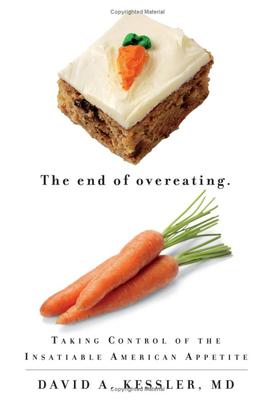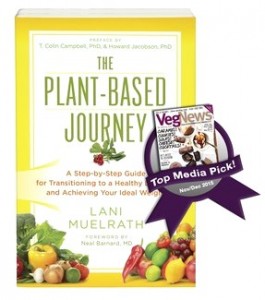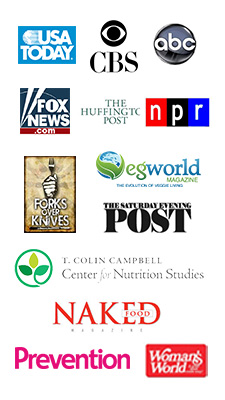 |
The educated guess was right.
Without having gotten my hands on the book to read cover-to-cover, it’s pretty clear that the elements of the new release The End of Overeating, as presented via the title and cover clearly depict just what this book is all about.
A telling interview with the author with some excellent insights delivered some great new vocabulary.
How about these words: “salient foods”, “hypereating”, and perhaps my favorite, “eatertainment”.
Also enlightening news is that the author, Dr David Kessler, is none other than the former commissioner of the US Food and Drug Administration under presidents George H. W. Bush and Bill Clinton. He’s done some serious time with the food industry.
And industry it is. Especially when it comes to “eatertainment.”
And since as we all know, bottom line, it’s about the calories when it comes to weight loss and weight management, “eatertainment” can be have a devastating effect on the best of our dietary intentions.
Here are a couple of excerpts from that interview:
McCready: This book started while watching an Oprah episode. Prior to that, had you ever seriously considered why food has such a pull over people in general, or you in particular?
Kessler: We implemented and helped design the food label—the modern nutritional facts that appear on the back of most packaged foods—back in the 1990s. That label was about the ingredients and nutritional value including percentage of daily values, but I never looked at the question that way. After watching that episode and that woman who couldn’t control her eating, I said to myself, “What’s going on?” As a physician, I asked myself, “What’s driving this?” I spent the next seven years trying to figure the answer to that out.
McCready: In your book, you discuss the business of food, explain how the food industry tries to manipulate appetites, and go so far as to make comparisons to big tobacco by implying that food has a pull over people the same way drugs do. Do you think that these food industries will be vilified or held financially accountable for obesity related diseases in the future?
Kessler: Fifty years ago, the tobacco industry, confronted with the evidence that smoking causes cancer, decided to deny the science and deceive the American public. Now, we know that highly palatable foods—sugar, fat, salt—are highly reinforcing and can activate the reward center of the brain. For many people, that activation is sustained when they’re cued. They have such a hard time controlling their eating because they’re constantly being bombarded—their brain is constantly being activated.
For decades the food industry was able to argue, “We’re just giving consumers what they want.” Now we know that giving them highly salient stimuli is activating their brains. The question becomes what do they do now?
Read the rest of the interview and more about the thought that went into this book on Louise McCready’s column on the Huffington Post.
P.S. If you need a refresher course on how the word “salient” might apply here (I did) here’s a clip from dictionary.com:
sa⋅li⋅ent
/ˈseɪliənt, ˈseɪlyənt/ Show Spelled Pronunciation [sey-lee-uhnt, seyl-yuhnt] Show IPA
–adjective
1. prominent or conspicuous: salient traits.
2. projecting or pointing outward: a salient angle.
3. leaping or jumping: a salient animal.
4. Heraldry. (of a beast) represented as leaping: a lion salient.
Now, all kinds of nutritious foods can qualify as “salient”. Yet in this context of “edibles” that may not always qualify as real “food”, the cleverness of the use of this as an adverb is…well, salient. 😉
| If you enjoyed this post, please consider leaving a comment, subscribing to email notification or subscribing to the feed to have future articles delivered to your feed reader. |
© Lani Muelrath All Rights Reserved





Hi Lani,
The link to the Huffington Post actually takes you to your previous blog posting. Here is the correct link to the article: http://www.huffingtonpost.com/louise-mccready/d-kessler-author-of-emthe_b_195676.html
🙂
MightyA
Gloria, thanks for the Mighty Aediting! I appreciate that you popped in to bring this to my attention.
What did you think of the interview?
L.
Lani,
Hi, late to the party on this one, but I had the same thoughts you did when I saw that cover. AND, I know that he’s right, if my own experience says anything about it.
Recently, I had IgG/immune complex testing done for potential food sensitivities. Boy, did I have a bunch! Within days of eliminating dairy/gluten/soy/eggs and scads of random items from my diet, I felt loads better, with enhanced energy levels. It dawned on me quickly that what I was really doing was “shopping the outside aisles” at the grocery store, and moving toward more of a “god-made” diet and away from processed junk. The result? 10 pounds vanished within a month.
I got to eat “off the diet” for a day, and you know…it was good. But, it wasn’t enough to justify how bad it made me feel a few hours afterward.
Hi Allison,
Never too late and you are welcome to come by and comment at any time!
How great that you were able to pinpoint so specifically personal food sensitivities. I’m curious, did you suspect these same items and found the testing to be a confirmation? 10 lbs in one month gone, what a treat!
I am very interested to read your experiences and appreciate the details you shared.
Thanks!
Lani